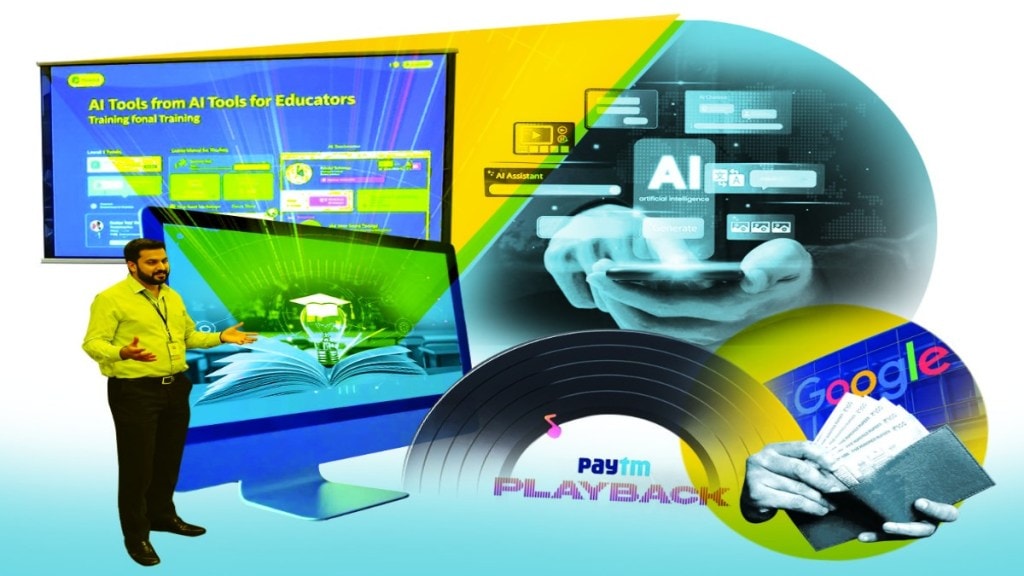Delhi teachers to get AI training
The Delhi government has announced an ambitious plan to train teachers in Artificial Intelligence (AI) to transform traditional classrooms into smarter, tech-driven learning spaces. This initiative, part of the government’s broader education modernisation strategy, will help educators integrate AI tools into lesson planning, assessments, and personalised learning experiences. Teachers will learn to use AI-powered platforms for data-driven insights, enabling them to identify student learning patterns and improve outcomes. The training will also focus on digital literacy and the ethical use of AI in education. By fostering AI proficiency among teachers, Delhi aims to prepare students for future careers shaped by technology.
Paytm introduces Playback
Paytm has unveiled Playback, India’s first AI-powered rap experience, blending creativity with advanced AI. The feature uses generative AI to create personalised rap songs based on user prompts, combining voice synthesis, rhythm, and lyrical flow. Users can put themes, emotions, or keywords, and Playback produces original rap verses tailored to them, showcasing the fusion of entertainment and technology. This innovation underlines the company’s investment in AI-based customer experiences beyond finance and payments. Playback highlights how AI can enhance self-expression, music personalisation, and cultural creativity in India’s digital ecosystem.
Google challenges to break its AI systems
Google has launched a new AI Red Teaming Challenge, offering rewards of up to $30,000 (around Rs 26 lakh) to individuals who can “break” or expose vulnerabilities in its AI systems. The initiative encourages ethical hackers, researchers, and developers to identify flaws, biases, or security risks within Google’s AI models and safety frameworks. This challenge is part of Google’s broader push for responsible AI deployment, emphasising transparency, safety, and accountability. Participants are invited to stress-test AI tools, including generative models, to prevent misuse or harmful outcomes. Offering significant financial incentives, Google hopes to attract global talent to contribute to building a more secure, reliable, and ethical AI ecosystem.
Helping developers build and ship AI agents
OpenAI has introduced AgentKit, a powerful toolkit that allows developers to create, test, and deploy custom AI agents directly within their applications. The new framework simplifies the process of integrating autonomous agents with real-world functions, such as scheduling, data analysis, and online automation. AgentKit provides APIs, libraries, and workflow tools to make building AI-driven assistants faster and more flexible. Developers can connect these agents to third-party apps or internal systems, enabling automation across diverse industries. With built-in safeguards and OpenAI’s policy alignment, AgentKit promotes responsible development of autonomous systems. By democratising AI development, OpenAI aims to empower creators, startups, and enterprises to innovate freely and safely, accelerating the global adoption of intelligent, user-centric technologies.
Robin Williams’s daughter slams AI videos
Zelda Williams, daughter of the late actor and comedian Robin Williams, has publicly criticised the use of AI to recreate her father’s voice and likeness in digital videos. She called the trend “disturbing”, arguing that such AI-generated imitations exploit her father’s legacy without consent or authenticity. Deepfake technology has been used to mimic celebrities, raising ethical concerns about identity, creativity, and privacy. Zelda emphasised that while AI can preserve art, it should never replace the human soul and emotional nuance that defined real performances. Artists and advocacy groups have echoed her concerns, calling for stricter regulations on AI-generated content. The incident highlights the urgent need for ethical frameworks governing AI use in media, when recreating deceased personalities.
Introducing apps in ChatGPT
OpenAI has expanded ChatGPT’s capabilities by introducing Apps in ChatGPT and a dedicated Apps SDK (software development kit). This new feature allows developers and businesses to build, integrate, and run custom applications directly within ChatGPT’s conversational interface. Users can interact with apps seamlessly, booking flights, analysing data, or managing tasks, without leaving the chat environment. The Apps SDK provides APIs, documentation, and developer tools to create safe, scalable extensions for a wide range of use cases. This marks a shift from ChatGPT being a static assistant to a dynamic AI platform capable of executing real-world functions. Developers can design experiences tailored to users’ workflows, unlocking the potential for smarter automation and collaboration. With built-in safety and data privacy standards, the new ChatGPT Apps ecosystem promises to redefine how people interact with AI across professional and personal contexts.
19-year-old Mumbai-born turns heads in Silicon Valley
Young entrepreneur Dhravya Shah has raised $3 million in funding for his AI-driven ventures and earned the prestigious O-1 visa, granted by the US to individuals with extraordinary ability. His projects focus on building scalable technologies that enhance business efficiency and decision-making using AI. Shah’s success story exemplifies the rise of young Indian technologists making waves in the international startup ecosystem. Beyond his ventures, he advocates for ethical AI use and open innovation, mentoring emerging founders worldwide. His achievements underscore how talent, vision, and responsible AI development can converge to create globally recognised impact in technology entrepreneurship.








